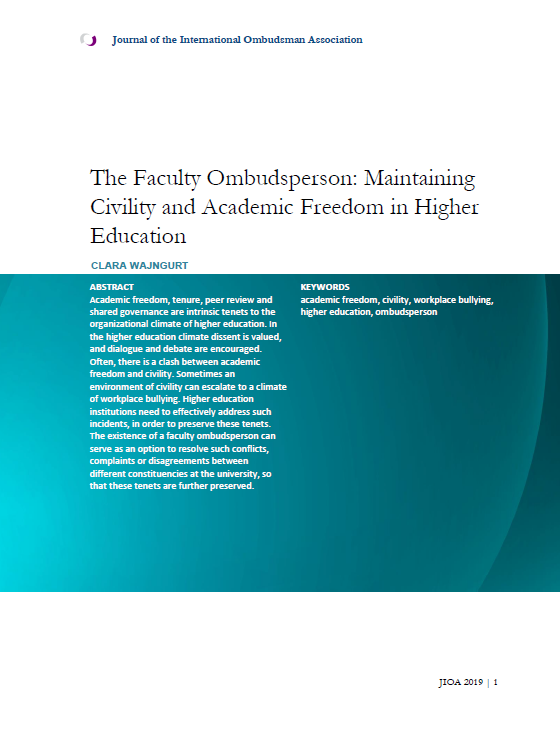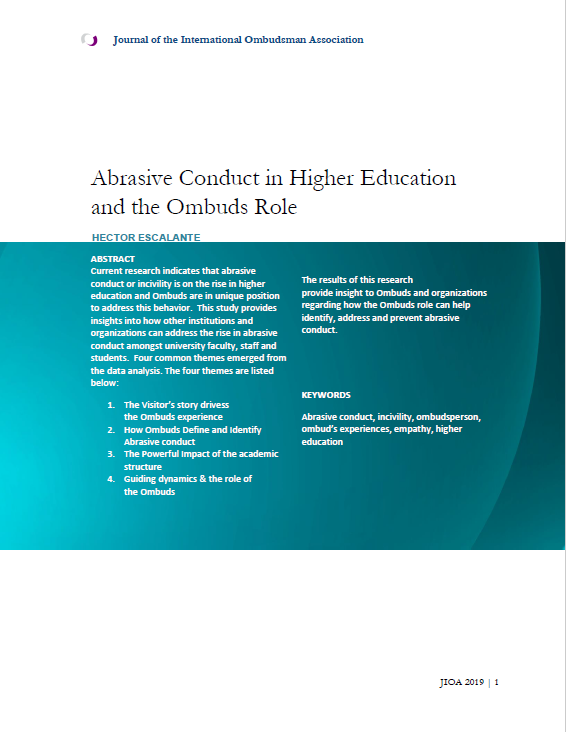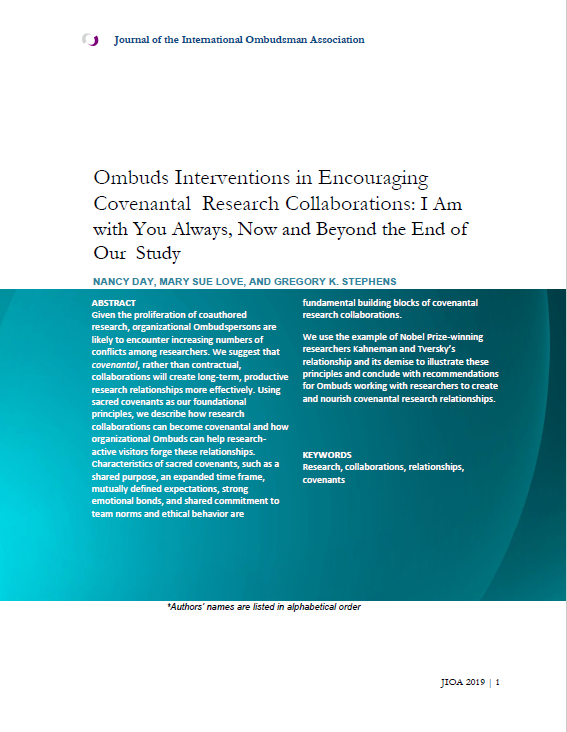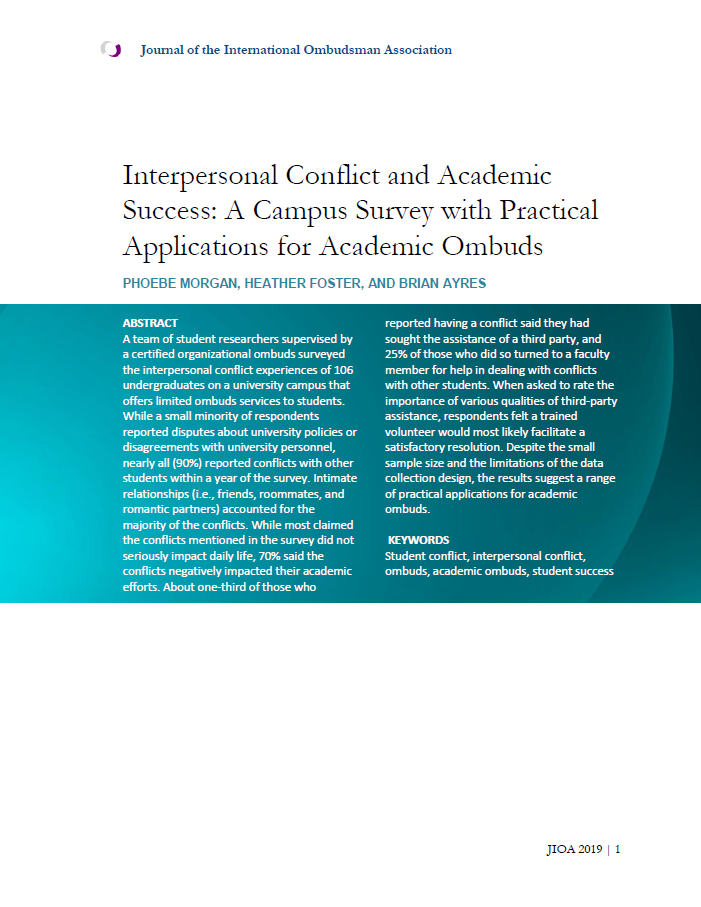Journal of the International Ombudsman Association (JIOA)
IOA Journal Volume 12, Issue 1
The Faculty Ombudsperson: Maintaining Civility and Academic Freedom in Higher Education
Clara Wajngurt
13 December 2019
 Abstract: Abstract:
Academic freedom, tenure, peer review and shared governance are intrinsic tenets to the organizational climate of higher education. In the higher education climate dissent is valued, and dialogue and debate are encouraged. Often, there is a clash between academic freedom and civility. Sometimes an environment of civility can escalate to a climate of workplace bullying. Higher education institutions need to effectively address such incidents, in order to preserve these tenets. The existence of a faculty ombudsperson can serve as an option to resolve such conflicts, complaints or disagreements between different constituencies at the university, so that these tenets are further preserved.
Abrasive Conduct in Higher Education and the Ombuds Role
Hector Escalante
9 December 2019
Abstract:
Current research indicates that abrasive conduct or incivility is on the rise in higher education and Ombuds are in a unique position to address this behavior. This study provides insights into how other institutions and organizations can address the rise in abrasive conduct amongst university faculty, staff, and students. Four common themes emerged from the data analysis. The four themes are listed below:
- The Visitor’s story drives the Ombuds experience
- How Ombuds Define and Identify Abrasive conduct
- The Powerful Impact of the academic structure
- Guiding dynamics & the role of the Ombuds
The results of this research provide insight to Ombuds and organizations regarding how the Ombuds role can help identify, address and prevent abrasive conduct.
Ombuds Interventions in Encouraging Covenantal Research Collaborations: I am with You Always, Now and Beyond the End of Our Study
Nancy Day, Mary Sue Love, and Gregory K. Stephens
6 December 2019
 Abstract: Abstract:
Given the proliferation of coauthored research, organizational Ombudspersons are likely to encounter increasing numbers of conflicts among researchers. We suggest that covenantal, rather than contractual, collaborations will create long-term, productive research relationships more effectively. Using sacred covenants as our foundational principles, we describe how research collaborations can become covenantal and how organizational Ombuds can help research-active visitors forge these relationships. Characteristics of sacred covenants, such as a shared purpose, an expanded time frame, mutually defined expectations, strong emotional bonds, and shared commitment to team norms and ethical behavior are fundamental building blocks of covenantal research collaborations.
We use the example of Nobel Prize-winning researchers Kahneman and Tversky’s relationship and its demise to illustrate these principles and conclude with recommendations for Ombuds working with researchers to create and nourish covenantal research relationships.
Interpersonal Conflict and Academic Success: A Campus Survey with Practical Applications for Academic Ombuds
Phoebe Morgan, Heather Foster, and Brian Ayres
6 June 2019
 Abstract: Abstract:
A team of student researchers supervised by a certified organizational ombuds surveyed the interpersonal conflict experiences of 106 undergraduates on a university campus that offers limited ombuds services to students. While a small minority of respondents reported disputes about university policies or disagreements with university personnel, nearly all (90%) reported conflicts with other students within a year of the survey. Intimate relationships (i.e., friends, roommates, and romantic partners) accounted for the majority of the conflicts. While most claimed the conflicts mentioned in the survey did not seriously impact daily life, 70% said the conflicts negatively impacted their academic efforts. About one-third of those who reported having a conflict said they had sought the assistance of a third party, and 25% of those who did so turned to a faculty member for help in dealing with conflicts with other students. When asked to rate the importance of various qualities of third-party assistance, respondents felt a trained volunteer would most likely facilitate a satisfactory resolution. Despite the small sample size and the limitations of the data collection design, the results suggest a range of practical applications for academic ombuds.
Read More Articles
About the JIOA
The Journal of the International Ombudsman Association (JIOA) is a peer-reviewed online journal for scholarly articles and information relevant to the ombudsman profession. As members of a relatively new profession, we continually strive to understand, define and clarify the role and function of the professional organizational ombudsman.
The JIOA will help foster recognition that what we do for our agencies, corporations, colleges, and universities is worthy of study. While we must vigorously protect the confidentiality of our interactions, we can still study and be studied to understand what we do and how we do it; what works well and what doesn't work; what our options are; how social, technical and legal changes may impact us; what the profile and career development of ombudsman professionals might be, and other matters of interest.
The JIOA can facilitate a greater interest in ombudsing, enhance our professional standing, and serve to give us a better understanding of our dynamic roles and the impact on our institutions and agencies. The Journal also will allow IOA members, other ombudsmen, and other professionals to reach out to their colleagues with their ideas, research findings, theories, and recommendations for best practices and to engage in ongoing discussions of critical issues.
Learn more about the JIOA and the manuscript submission process.
If you have any questions about the JIOA please contact the co-editors via email at [email protected].
- Shannon Lynn Burton, Michigan State University
|



